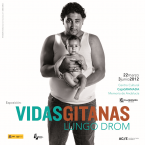Translation Romani has decided to maintain use of the word Romani in all language versions of this website, inclusively and in reference both to the language and people of all the diverse ethnic communities throughout the world, i.e. Roma, Sinti, Manuš, Calé, Romanichal, Kalé, and many others. Please read the important notes from our translators for explanations and other translations currently in use locally, nationally or regionally.
Close this box.
Vidas Gitanas es un proyecto del Instituto de Cultura Gitana –fundación pública del Ministerio de Cultura- que muestra la realidad social y cultural del pueblo gitano español. Se trata de una muestra integral y multimedia que ahonda en una visión moderna de un pueblo clave para entender la historia de Andalucía y la de España.
Extractos:
El 8 de abril, Día del Pueblo Gitano, fue celebrado con una visita guiada a la exposición Vidas Gitanas con gitanos y gitanas de los pueblos de Santa Fe, Atarfe y Pinos Puente de Granada, compuesta por unos 70 hombres y mujeres.
Gitanos y payos han colaborado en este proyecto expositivo -fuertemente marcado por los conceptos rupturistas, el didactismo y la interactividad con el público- que se aboca sobre la minoría étnica española más importante de un modo no hecho hasta este momento.
Leer: "Seis siglos de vidas gitanas" (Rocio Huerta, El País, Cultura).
Agradezco a José Antonio y el Centro Sociocultural Gitano Andaluz (Granada) por las informaciones.



